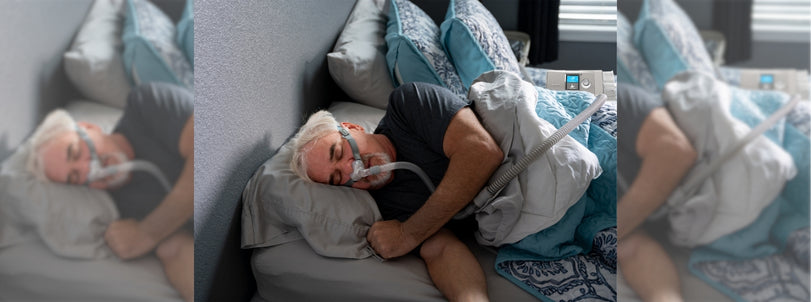
Best BiPAP Accessories for Comfort and Effective Therapy
Bilevel positive airway pressure, commonly known as BiPAP, is a non-invasive method of managing breathing conditions, including sleep apnea. A BiPAP machine delivers pressurized air at two different levels through a mask worn on the face. It assists breathing and helps treat breathing difficulties during sleep.
If you use a BiPAP machine to help manage sleep apnea symptoms or other breathing conditions such as COPD, you must have the correct accessories. Accessories can significantly enhance the comfort and therapeutic effect of your BiPAP machine.
The quality of BiPAP machines varies significantly, and there are differences in features, complexity, and price. There are many different variations available, and by exploring different accessories, you can customize your machine for greater comfort and efficacy.
BiPAP machines offer two pressure levels, one for inhalation and another for exhalation. This is unlike CPAP machines, which provide constant air pressure throughout the night. This means BiPAP is a preferred alternative for patients with complex breathing issues where different air pressure levels are necessary.
By ensuring you have the right equipment, you can improve your sleep experience further. This begins with choosing a well-fitting BiPAP mask to look at additional accessories such as a humidifier. It is also vital to include maintenance essentials, including filters and cleaning sprays in your list of BiPAP medical equipment.
Choosing each component carefully will help improve your therapy experience and also achieve better results. This guide will explore essential BiPAP accessories, including masks, humidity enhancements, and device maintenance tips, helping you enjoy the maximum therapeutic effect from your BiPAP machine.
Choosing the Right Mask for Comfort and Efficiency
Choosing the right mask is essential for effective BiPAP therapy. You need to find a mask that is comfortable to wear and fits your mouth correctly so that there are no air leaks, allowing proper air delivery. The mask should create a seal so that you receive the prescribed pressure directly into your lungs for optimal effect.
There are different types of masks, and each has its advantages and considerations.
Nasal Masks
Nasal masks cover only the nose, starting at the bridge and ending above the upper lip. As the name suggests, they suit patients who breathe through their nose.
- Comfort and Fit: Nasal masks are compact and minimal, less intrusive than full-face masks. They are suitable for patients who move around in their sleep or are side sleepers, as they can maintain a seal even when there is a lot of movement. They are suitable for patients with facial hair. They are also ideal for patients who suffer from claustrophobia due to the smaller size and less coverage. However, they may not be suitable for mouth breathers or those with frequent nasal congestion.
- Examples: The ResMed AirFit P10 and the ComfortGel Blue Nasal CPAP/BiPAP Mask are popular nasal masks. They are lightweight and offer quiet air diffusion, ensuring a comfortable and uninterrupted sleep.
Full Face Masks
Full-face masks, also known as oronasal masks, cover both the nose and mouth. They have many advantages.
- Mouth Breathers: A full-face mask is essential to ensure continuous airflow if you breathe through your mouth during sleep. These masks are also ideal for those with nasal congestion or who require higher pressure settings.
- Comfort and Seal: Full-face masks provide a secure fit and reduce pressure points, making them comfortable for long-term use. However, they can be larger and may cause skin irritation if incorrectly fitted.
- Examples: Popular options include the ResMed AirFit F30, Fisher & Paykel Simplus, and Philips Respironics DreamWear full-face masks.
Nasal Pillow Masks
Nasal pillow masks sit below the nose and feature silicone pillows that are inserted just inside the nostrils to create an airtight seal. They also have many benefits.
- Minimal Design: The minimalistic design enables greater freedom of movement and does not obstruct your field of vision. This makes them ideal for reading or watching TV before sleep.
- Comfort: Nasal pillow masks are designed to be soft and weightless, providing a comfortable fit. They are also easy to assemble and remove.
- Examples: ResMed AirFit P10 and the Philips Respironics DreamWear nasal pillow masks are popular choices.
Understanding the advantages and drawbacks of each and considering your own requirements can help you choose the most suitable mask for yourself. Your doctor will also be able to advise which is preferable for you.
Enhancing Humidity and Comfort
Maintaining the proper humidity levels is essential during BiPAP therapy to improve comfort and adherence to the treatment. The proper humidity levels help prevent dryness and irritation in the nose and throat, enabling better quality sleep.
Humidifiers
A humidifier adds warmth and moisture to the air before it is delivered into your airways. The air passes over a heated water reservoir and has many benefits.
- Preventing Dryness and Irritation: Many patients experience dry throat and irritation because of the constant air pressure. A humidifier prevents this by adding moisture to the air. This prevents dryness, reduces the risk of nosebleeds, and minimizes the risk of infection. It is particularly beneficial in dry climates or conditions.
- Adjustable Settings: Many BiPAP machines have integrated humidifiers that allow users to adjust the humidity levels based on their comfort needs. Respironics BiPAP Pro features System One Humidity Control technology, which analyses ambient temperature and patient airflow to provide the correct humidity level.
- Comfort and Compliance: By maintaining the natural moisture levels in the airways, a humidifier can significantly improve the comfort and compliance of BiPAP therapy.
Heated Tubing
Heated tubing is also essential for optimal BiPAP therapy. There are many advantages of including heated tubing in your setup.
- Preventing Condensation: Heated tubing prevents condensation from forming inside the tube by keeping the air at a consistent temperature.
- Enhancing Comfort: Heated tubing provides warm air, making inhaling more comfortable, especially in cold weather. This helps reduce nasal irritation, dry mouth, and sore throats by maintaining the moisture levels in the air.
- Compatibility and Maintenance: It is crucial to ensure that your tubing is compatible with your BiPAP machine. It is recommended that the tubing be replaced every 3-6 months to maintain hygiene and effectiveness.
Additional accessories, such as a BiPAP pillow or mask liners, can also increase the efficacy of your therapy, ensuring better adherence and compliance.
Securing and Maintaining Your BiPAP Device
You must clean and maintain your BiPAP machine and accessories for optimal therapeutic effect. You need to follow the manufacturer’s guidelines and carry out regular visual checks on your machine and accessories to ensure no dirt or damage. This is important for your comfort and safety and will help you achieve the best possible therapy.
Headgear and Straps
Properly maintaining and cleaning your headgear and straps is essential for both comfort and hygiene.
- Cleaning Headgear: It is recommended to clean your headgear straps at least once a week. Handwashing will help prevent any damage. Leave the velcro closed and any clips attached to avoid needing readjustments. After washing, make sure to dry your headgear thoroughly.
- Adjusting and Replacing: Ensure that your headgear straps fit correctly and are not too tight or loose. Typically, headgear should be replaced every 6 months for optimal fit, as they can be affected by wear and tear.
- Daily Care: Daily maintenance, including wiping down the straps with a damp cloth will keep them clean and fresh.
Replacement Filters and Cleaning Supplies
It is important to replace filters regularly and clean your machine and accessories according to manufacturers guidelines to maintain the hygiene and effectiveness of your BiPAP device.
- Air Filters: Reusable air filters should be washed once a week and replaced every 2-3 months. Disposable filters need to be replaced once a month. This ensures that the air is free from dust, pollen, and other airborne particles.
- Cleaning Supplies: Follow the manufacturer’s guidelines to clean your BiPAP components. Avoid harsh chemicals and abrasive materials that can damage your equipment.
- Tubing and Humidifier: Tubing should be rinsed daily and cleaned weekly. The humidifier tank should be rinsed daily and cleaned with white vinegar and water solution once a week. This helps prevent the buildup of bacteria and other microorganisms in your equipment.
Following these maintenance tips ensures your BiPAP device remains in good condition, providing effective and comfortable therapy.
Conclusion
BiPAP therapy plays a vital role in managing breathing conditions, including sleep apnea. You must have the correct BiPAP accessories for a better night’s sleep.
First, you must choose the mask that best suits your preferences and circumstances. There are different types of masks depending on whether you prefer a small, minimal type of mask or a full-face mask.
You must also explore additional accessories, such as a humidifier or heated tubing for your BiPAP machine. These accessories can enhance comfort and improve therapeutic effect.
Finally, it is essential to clean and maintain your accessories correctly, according to manufacturer guidelines, for optimal function and to prevent the buildup of bacteria and other microorganisms, which can be a health hazard.
Speak to your doctor and find out how to tailor your BiPAP machine for added comfort, efficacy, and compliance to beat your symptoms and improve your health and well-being.
